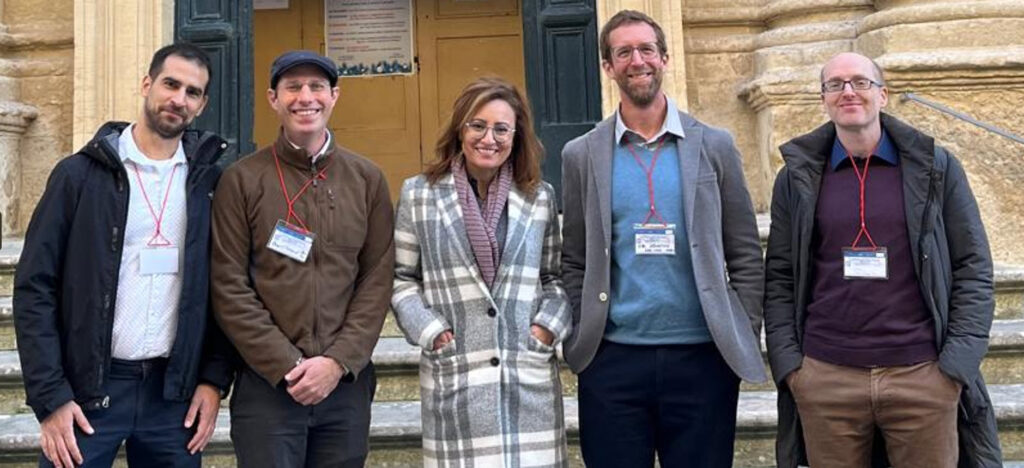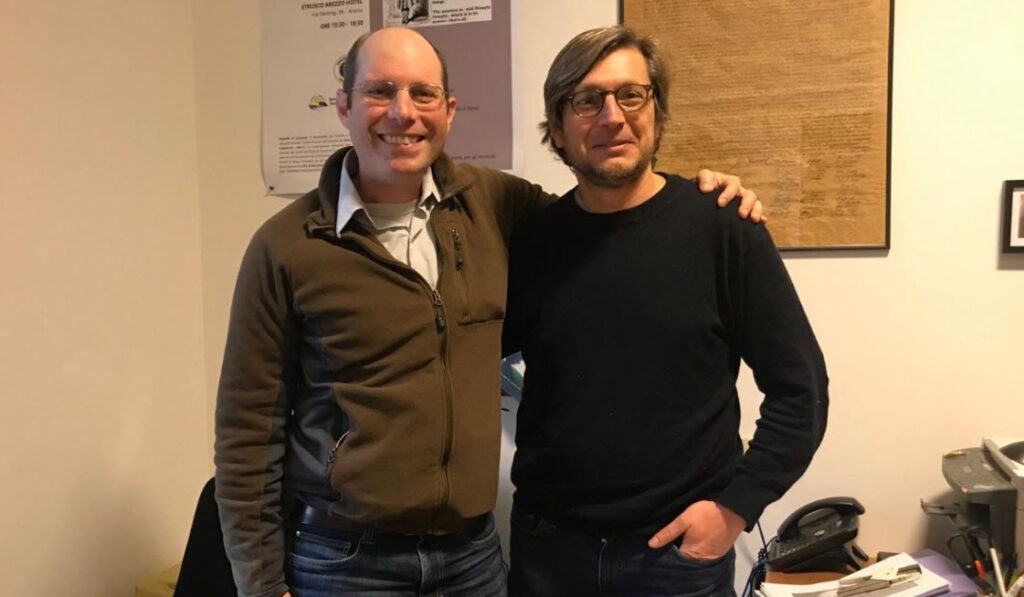In a bold initiative to tackle contemporary global challenges, 20 universities across Italy, Israel, and the Balkans have united under the International Mobility Program—Assessing Constitutional Crisis Impact and Security (IMP–ACCTS). Spearheaded by the University of Siena with nearly €2.5 million in funding from the Italian Ministry for University and Research, the program fosters dialogue, academic mobility, and innovative solutions to constitutional crises and security through initiatives like research exchanges and joint activities, including summer and winter schools.

L-R: Oz Nacker, Director of Student Exchange, and Daniel Schuval, Senior Advisor for Internationalization from BIU’s International School, with Dr. Manal Totry-Jubran, Dr. Ori Aronson, and Dr. Ittai Bar-Siman-Tov from BIU’s Faculty of Law at the Kick-Off Conference in December 2024
“Addressing constitutional crises requires not just interdisciplinary attention but also an international perspective,” emphasizes Prof. Mario Perini from the University of Siena, the program’s coordinator and a constitutional law expert. (Read our profile about Prof. Perini here.) “This initiative brings together diverse academic realities, enriching participants with the knowledge, skills, and methodologies needed to tackle global challenges.”
The program unites institutions with complementary strengths, including four Italian universities—the University of Milano-Bicocca, the University of Salento, and the University of Cagliari—working alongside eight Israeli institutions, including Bar-Ilan University, the Hebrew University of Jerusalem, and Tel Aviv University. Balkan universities will also play an essential role, including eight from Albania, Kosovo, North Macedonia, Serbia, and Bosnia and Herzegovina. (A full list of partners can be found at the end of this article.)
Collaboration Across Borders
Bar-Ilan University serves as one of the main partners in Israel. According to Daniel Schuval, Senior Advisor for Internationalization at BIU’s International School, the collaboration reflects a shared commitment to academic excellence and innovation. “Israeli institutions bring a unique perspective, deeply informed by the nation’s experiences with constitutional law and conflict resolution. Their participation enriches the program’s focus on governance and security, fostering a deeper understanding of global interdependencies,” says Schuval.
Prof. Perini highlights the value of these partnerships. “Our collaboration with Bar-Ilan and the other partners has been crucial to the program’s success. It ensures our activities meet the real needs of participants by drawing from diverse perspectives and cultural experiences. This synergy is what sets IMP–ACCTS apart.”
Focus on Mobility and Global Issues
The program emphasizes academic mobility across disciplines, enabling students to engage in research and interdisciplinary courses. Faculty members participate in joint teaching and seminars, while administrative staff exchange best practices in managing international projects.

L-R: Daniel Schuval and Prof. Mario Perini
“The mobility aspect of IMP–ACCTS is transformational,” says Prof. Perini. “It strengthens institutional capacity and promotes intercultural dialogue, benefiting not only the participating institutions but also the individuals who take part in these exchanges.”
The program’s thematic focus resonates with pressing global issues, such as migration, data security, minority rights, and geopolitical tensions. Prof. Perini reflects on its relevance: “The fragility of democratic institutions today underscores the need for structured debate and international dialogue. Programs like ours are vital to shaping informed solutions that balance security and civil liberties.”
Joint Activities and Real-World Impact
IMP-ACCTS hosts summer and winter schools that address topics like constitutional violations and national security through an intensive mix of lectures, simulations, and case studies. These activities, led by experts from participating universities, equip attendees with practical tools and theoretical insights.
Schuval underscores the importance of these initiatives: “Through joint activities, participants gain critical soft skills—teamwork, intercultural communication, and the ability to tackle complex issues. These experiences are invaluable for addressing global challenges.”
The interdisciplinary approach extends to research, focusing on topics such as governance, migration, and security frameworks. Prof. Perini notes, “Our activities are designed to not only explore these issues academically but also influence real-world policies by fostering collaboration between universities, policymakers, and institutions.”
Looking Ahead
Prof. Perini envisions a bright future for IMP-ACCTS. “I hope this program evolves into a robust platform for international collaboration, perhaps through joint doctoral programs or dedicated research centers. The long-term goal is to establish lasting partnerships that address critical global challenges.”
Schuval shares this optimism, emphasizing the program’s role in fostering academic resilience during crises. “Collaborations like IMP-ACCTS demonstrate the power of academic institutions to drive change even in challenging times, reinforcing the importance of dialogue and innovation,” he says.
By creating a dynamic network of academic cooperation, IMP-ACCTS is not just shaping the discourse on constitutional crises and security but also preparing a new generation of scholars to confront the complexities of the modern world.
Partner Universities
The University of Siena in Italy will be the project leader and will coordinate the program. The other Italian partners include the University of Milano-Bicocca, the University of Salento, and the University of Cagliari.
The eight Israeli partners include Bar-Ilan University (the coordinator for the Israeli partners), Hebrew University of Jerusalem, Tel Aviv University, University of Haifa, Ben Gurion University of the Negev, Reichmann University, Sapir Academic College, and Zafat Academic College (ZAC). Bar-Ilan University will serve as the coordinating institution in Israel.
The Balkan partners include the Mediterranean University of Albania and the University of Tirana in Albania; the University of Prishtina in Kosovo; the University of Skopje in North Macedonia; the Union University Belgrade in Serbia; and the University of Banja Luka, the University of Mostar, and the University of Sarajevo in Bosnia and Herzegovina.
Contact Us for More Info
Leave your details and we’ll get back to you soon

